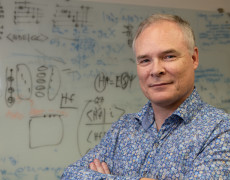Berkeley Lab’s Bert de Jong talks about the First International Workshop on Quantum Software
November 4, 2020
As modern computers begin to reach the limit of their processing power, quantum computing has the potential to solve more specialized problems that require immensely robust computing. Interacting with these quantum systems will require a unique collection of software tools and techniques.
Toward this end, the first-ever International Workshop on Quantum Computing Software, to be held November 11 during SC20, will explore the innovative software needed to make quantum computing practical and accessible. In this Q+A, Lawrence Berkeley National Laboratory (Berkeley Lab) Senior Scientist Bert de Jong, who is on the workshop’s program committee, talks about what attendees can expect to take away from this event.
Why is an international workshop on quantum software needed right now?
Right now, the biggest challenges in quantum computing go beyond hardware; we have to think about how we’re actually going to interact with these systems. To do that, we need programming languages, compilers, profilers, numerical simulators, debuggers, control and characterization software, and more.
The goal of this workshop is to look at the current landscape of software development and research — where are the advances, what pieces are missing — where are we at when it comes to a software stack for a developer or end-user to code for a quantum computer. As organizers of this workshop, we wanted to familiarize people with the state-of-the-art software that is currently available. There’s a lot of open source software out there that not many people are aware of. This workshop is about communicating software availability, as well as fostering collaboration and beginning conversations about how we can work together to integrate different pieces of software development.
All of the software tools that will be presented in the workshop are open source. I think anyone who is interested in writing codes for quantum computers in the near future or beyond will benefit from the program that we put together.
What inspired you to be part of the program committee for this workshop?
The program committee consists of representatives from practically every Department of Energy national laboratory that has a quantum computing program, and I am the representative from Berkeley Lab. At Berkeley, I lead the QAT4Chem and AIDE-QC projects that are focused on developing algorithms and software for Noisy Intermediate-Scale Quantum (NISQ) computers and beyond.
It’s very fitting the national labs are taking the lead in hosting the first International Workshop on Quantum Computing Software because we have always played that role as incubators in the research community collaborating with academia and industry.
The idea for this workshop came from a tutorial and a BoF (birds-of-a-feather) session that we held at SC19 on quantum computing. Both of the events had very large participation; the rooms were overflowing and there were numerous discussions about software. This of course isn’t surprising because the audience at SC is pretty technical and a lot of programmers attend.
We hope this new workshop will be the first in a series held at the SC conferences that explore quantum software. When we opened the call for paper submissions earlier this year, we received about 30 papers from around the world. We narrowed this down to 13 talks for the workshop, but it just goes to show that there is a lot of interest in this field and a lot of exciting work being done.
Although the national labs are taking the lead in organizing this event, there will be speakers from around the world. We hope to inspire new ideas, conversations, and, most importantly, collaborations.
In addition to de Jong, the other workshop organizers are Travis Humble (ORNL), Michael McGuigan (BNL), Yuri Alexeev (ANL), Scott Pakin (LANL), Jim Kowalkowski (Fermilab), Ojas Parekh (SNL), Nathan Wiebe (PNNL/ Univ. of Washington), and Jonathan DuBois (LLNL). See the full workshop program.
About Computing Sciences at Berkeley Lab
High performance computing plays a critical role in scientific discovery. Researchers increasingly rely on advances in computer science, mathematics, computational science, data science, and large-scale computing and networking to increase our understanding of ourselves, our planet, and our universe. Berkeley Lab’s Computing Sciences Area researches, develops, and deploys new foundations, tools, and technologies to meet these needs and to advance research across a broad range of scientific disciplines.







 Instagram
Instagram YouTube
YouTube